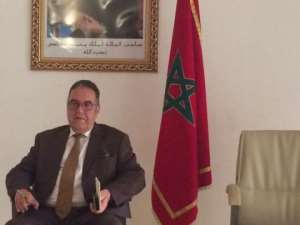
The Ghanaian economy continues to impress potential investors with lots of proposals coming up.
The latest group to show interest are investors from the Kingdom of Morocco, who are increasingly expressing interest in putting their money in the Ghanaian economy.
This was disclosed by Mr Mohammed Farahat, the Moroccan Ambassador to Ghana.
The investors are targeting areas of agriculture, renewable energy, and tourism.
Mr Farahat was addressing journalists in Accra, his first media encounter since he assumed duty in May, this year.
He said there was already a Moroccan company looking at how to harness the abundant sun to produce solar energy in Takoradi. Another was also in Kumasi exploring ways of generating power from wind.
He made reference to the strong ties between Ghana and Morocco, dating back to 1961 when Ghana's first President Osagyefo Kwame Nkrumah and Morocco's King Mohammed V, and said this could only continue.
Mr Farahat, touched on a number of MoUs recently signed between Ghana and his country and said these had opened opportunities for both countries.
'So far everything is moving on smoothly, there is no obstacle. We are in the phase of follow-ups to the various agreements. What we are doing now is looking at synergies.
We have many things that Ghana need and vice-versa. The idea is to make the two countries benefit from the free trade agreement.'
The Ambassador said the two countries had distinct opportunities, which each could profit from to turn the fortunes of their economies around, grow them to give employment to the youth.
'It is time to go back to the African fundamentals to transform the economy, and equip the youth with entrepreneurial skills so that they will not be looking for work but will rather create employment and recruit people.'
He added that through that the much talked about Africa youth migrating to the West would be a thing of the past.
'I do not understand why we Africans who are highly skilled are called immigrants but those from the West who work in Africans are called expatriates.'
'We need to transform our economy, be confident, listen to our leaders, keep believing in ourselves that we have everything and we can make it.'
Mr Farahat expressed worry about the rising number of children on the streets in the continent and said the situation was an indication that Africa had a lot to do to address the challenge.
----Ghana News Agency




 Tuesday’s downpour destroys ceiling of Circuit Court '8' in Accra
Tuesday’s downpour destroys ceiling of Circuit Court '8' in Accra
 SOEs shouldn't compromise on ethical standards, accountability – Akufo-Addo
SOEs shouldn't compromise on ethical standards, accountability – Akufo-Addo
 Father of 2-year-old boy attacked by dog appeals for financial support
Father of 2-year-old boy attacked by dog appeals for financial support
 Jubilee House National Security Operative allegedly swindles businessman over sa...
Jubilee House National Security Operative allegedly swindles businessman over sa...
 Nobody can order dumsor timetable except Energy Minister – Osafo-Maafo
Nobody can order dumsor timetable except Energy Minister – Osafo-Maafo
 Mahama wishes National Chief Imam as he clock 105 years today
Mahama wishes National Chief Imam as he clock 105 years today
 J.B.Danquah Adu’s murder trial: Case adjourned to April 29
J.B.Danquah Adu’s murder trial: Case adjourned to April 29
 High Court issues arrest warrant for former MASLOC Boss
High Court issues arrest warrant for former MASLOC Boss
 Align academic curriculum with industry needs — Stanbic Bank Ghana CEO advocates
Align academic curriculum with industry needs — Stanbic Bank Ghana CEO advocates
 Election 2024: We'll declare the results and let Ghanaians know we've won - Manh...
Election 2024: We'll declare the results and let Ghanaians know we've won - Manh...
